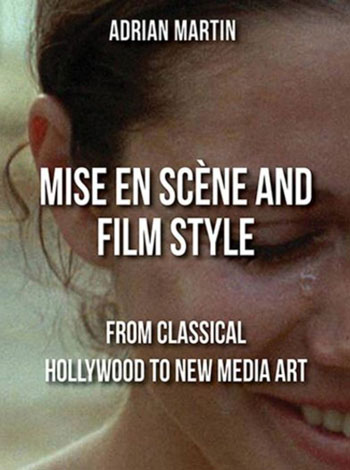Adrian Martin, the prolific critic who’s contributed to Keyframe on occasion and is currently teaching in Frankfurt, has a new book out, Mise en Scène and Film Style: From Classical Hollywood to New Media Art. The first review that I’m aware of comes from his friend and LOLA coeditor Girish Shambu, who calls it “a wonderfully ambitious and erudite work… This book is trying to do at least four things.” A sharp and concise outline follows. So, too, does a load of links to Girish’s recent reading, by the way.
You may remember that in August, Adrian Martin wrote about the mise en scène of Hitchcock’s Notorious (1946) for 16:9. And speaking of Notorious, Cinephilia & Beyond has put together a roundup on “one of the most famous shots in cinematic history.”
Having just read the new bilingual collection edited and translated by Stephen Sartarelli, The Selected Poetry of Pier Paolo Pasolini, Jonas Mekas set down some thoughts, added a clip from a conversation with PPP in 1967 and then another from one of his own diary entries written in 1959. As you’d expect, the collage featured in the new issue of BOMB is wonderfully evocative. Here’s how it begins:
That summer, that hot Roman summer afternoon, I see you sitting on the curb, waiting for the door to open, & seeing all those movies, yes, that hot Roman summer day.
Later. “Will there be a revolution?” you said, you asked. You stood by the window, in one of those workers’ apartment buildings built by Mussolini that you filmed in Mamma Roma. “Will there be a revolution?” “Yes,” I said, “we’ll do it with our cameras. We’ll surround the world with our cameras, the streets, the offices, factories, prisons—everything will be revealed, yes,” I said. You stood, you still stood by the window, looking out. A pause. Then: “Yes,” you said, “but for how many years now, for how many years have we had typewriters … But did the typewriters produce a revolution?”
RogerEbert.com is running an excerpt from Tina Hassannia‘s new book, Asghar Farhadi: Life and Cinema: “Farhadi did believe that following the success of A Separation, too many critics mistakenly called the film a comprehensive cross-section of how Iranian society operates. One of the great accomplishments of that film is how it both ties into specific cultural details and still manages to consistently maintain a universal essence that appeals to cinephiles the world over.”
“Poetic, allusive, intensely personal, highly stylized, and as rich aurally as visually, the films of Terence Davies look, sound and feel quite unlike the work of any other contemporary director,” writes Alex Ramon at PopMatters. And in Terence Davies, “Michael Koresky succeeds in doing justice to the complexity and the singularity of Davies’s output.”
“Hal Hartley’s experimental film Flirt came together on a napkin at Cannes 1995.” Eat Drink Films is running an excerpt from Ted Hope‘s Hope for Film: From the Frontlines of the Independent Cinema Revolutions.
“In 1970, Richard Warren Lewis, of Playboy, went to Newport Beach, California for a one-on-one with John Wayne,” writes Duncan White in the Telegraph. “What resulted was one of the most magnificently appalling interviews in the history of Hollywood.” Truly. White’s got some nasty, nasty quotes as a sampler. “Marc Eliot’s new biography of Wayne, American Titan: Searching for John Wayne, quotes extensively from the interview but not from the racist passages. Twice Eliot mentions Wayne being heckled as a racist but he never explains why. In most circumstances you would assume the biographer was trying to cover up for his subject. Not Eliot; American Titan is no hagiography. It is instead a shoddy book.”
Anjelica Huston has a newish memoir out, A Story Lately Told: Coming of Age in Ireland, London, and New York, and the New York Times asks her about her reading life. “Who is your favorite novelist of all time?,” for example. “I’d have to say, for sheer force of beauty, Leo Tolstoy.” Or: “What’s the best book about Hollywood?” Huston: “The Last Tycoon, by F. Scott Fitzgerald, is very good. Picture, by Lillian Ross, is a wonderfully funny and brilliantly astute document about the making of my father’s film The Red Badge of Courage.”
Also in the NYT, Lisa Schwarzbaum asks, “When did self-proclaimed movie geekdom supplant fandom as a badge of superior commitment to cinema love?” Schwarzbaum herself is “more fan than geek” and offers her takes on Roger Moore’s (with Gareth Owen) One Lucky Bastard: Tales from Tinseltown, Sophia Loren‘s Yesterday, Today, Tomorrow: My Life, Shawn Levy’s De Niro: A Life, Peter Ackroyd’s Charlie Chaplin: A Brief Life, Chris Taylor’s How Star Wars Conquered the Universe: The Past, Present, and Future of a Multibillion Dollar Franchise and the just-mentioned Anjelica Huston memoir.
For Bookforum, Kaitlin Phillips reviews Lena Dunham‘s new book, Not That Kind of Girl: A Young Woman Tells You What She’s “Learned”: “Only 28, she has already surpassed her parents in fame and bagged the New York social trifecta: career, co-op, boyfriend. It’s a good moment, in other words, to write a memoir. But is it a good moment to produce literature? Do we care?”
For news and tips throughout the day every day, follow @KeyframeDaily. Get Keyframe Daily in your inbox by signing in at fandor.com/daily.




